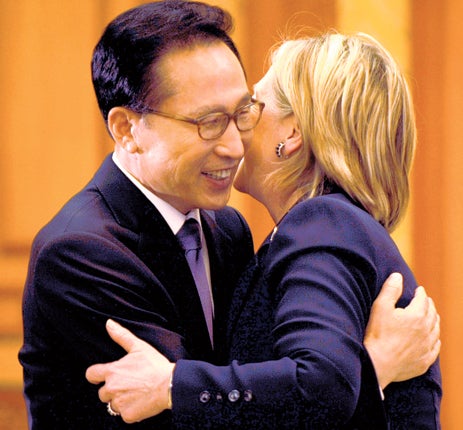Clinton seeks a global response to Korea crisis

Your support helps us to tell the story
From reproductive rights to climate change to Big Tech, The Independent is on the ground when the story is developing. Whether it's investigating the financials of Elon Musk's pro-Trump PAC or producing our latest documentary, 'The A Word', which shines a light on the American women fighting for reproductive rights, we know how important it is to parse out the facts from the messaging.
At such a critical moment in US history, we need reporters on the ground. Your donation allows us to keep sending journalists to speak to both sides of the story.
The Independent is trusted by Americans across the entire political spectrum. And unlike many other quality news outlets, we choose not to lock Americans out of our reporting and analysis with paywalls. We believe quality journalism should be available to everyone, paid for by those who can afford it.
Your support makes all the difference.Hillary Clinton, the US Secretary of State, upped the ante in the crisis on the Korean Peninsula yesterday, calling on the rest of the world to co-operate in a "strong but measured response" to Pyongyang for its alleged attack on a South Korean gunboat.
Speaking in the South Korean capital Seoul, Mrs Clinton called the evidence "overwhelming" and the conclusion "inescapable." "The international community has a responsibility and a duty to respond," she said, as defectors in the city warned that Pyongyang is preparing for war.
Pyongyang calls the results of an investigation into the March 26 sinking of the South Korean Cheonan gunboat a "fabrication" and warned that it will retaliate against attempts to impose sanctions. North Korean sources in Japan and Seoul blame the sinking, which killed 46 sailors, on a friendly-fire incident involving a US submarine.
But last week's report by a team of international investigators said there was "clear and definitive material evidence" linking Pyongyang to the attack.
Mrs Clinton failed to persuade China – Pyongyang's sole ally in the region – to condemn the North or back sanctions during two days of talks in Beijing. Wu Dawei, China's special envoy for Korean affairs, was in Seoul last night trying to defuse the crisis. Beijing, which is conducting its own investigation into the sinking, believes sanctions could further provoke the North. "We have always believed dialogue is better than confrontation," said Zhang Zhijun, the Chinese vice-foreign minister.
But South Korea, which this week announced a maritime blockade and trade ban with the impoverished North,is in no mood to compromise. The South's military has resumed psychological warfare, training radio broadcasts and giant loudspeakers across the demilitarised zone that separates the countries.
Meanwhile, the North's ailing leader Kim Jong-il has ordered his military commanders to prepare for war, according to sources in Seoul. "We are hearing that soldiers have been ordered back to barracks and the leadership is calling the sanctions an attempt to destroy the North," said Kim Sung-min, the head of Seoul's Free North Korea Radio, which has a network of clandestine journalists across the border.
A state of emergency has been declared in North Korea, with a travel ban and orders to dim lights and save energy. Mr Kim ordered the military, including the Worker-Peasant Red Guard and the Red Youth Guard, to be ready for conflict, according to the South Korean press.
Pyongyang regards the South's actions as "a phase in the war", said the North's official Korean Central News Agency, which again promised to "respond to any kind of punishment, retaliation, or sanctions with tough measures, including an all-out war". Observers in the South are struggling to decipher the messages coming from the North, which has a history of taking both sides to the brink before stepping back.
The disappearance of four North Korean submarines in the sea off the Peninsula has rattled the South's military. Sources in the Seoul government quoted in the South Korean press said the subs left their base in the North on Monday and went off radar. "It is rare for four North Korean subs to disappear at once," said one military commander.
North Korea also accused the South of intruding into its waters during a 10-day period this month, Yonhap news agency said.
Mrs Clinton pledged yesterday to back in full the South's responses to Pyongyang's "policy of belligerence". "We will stand with you in this difficult hour and we will stand with you always," she said in a joint conference with Yu Myung-hwan, South Korea's foreign minister. But her demands that the North "halt its provocations and its policy of threats and belligerence toward its neighbours and... comply with international law" are meaningless without the support of China, say experts.
Beijing has so far declined to condemn the frigate attack, but Mrs Clinton said yesterday: "We expect to be working with China as we move forward in fashioning a response."
Join our commenting forum
Join thought-provoking conversations, follow other Independent readers and see their replies
Comments